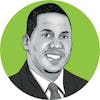 See
more of the story
See
more of the story
Last Sunday, I skated next to Jeff McCray, 19, as he twirled to the tunes blasting through his AirPods and glided beneath the pulsating strobe lights at Skateville in Burnsville — one of the few remaining roller rinks in the Twin Cities.
On the other side of the rink, his friend, a photographer and DJ named Josh Lemonade, floated along the wall, moving his skates forward and backward like a child in socks on a linoleum kitchen floor. He perfected his dancing style during his time in New York City, and he can now do things on roller skates that few can execute in shoes.
The two became friends three years ago when they met at Skateville, which features a multicultural clientele, good music and fun. At the roller rink, there is equality and diversity that illustrate the possibilities within the Twin Cities.
"Coming here to skate, you can still keep your body in shape and then you can meet tons of new people on top of that," McCray said. "I've met a lot of people I consider friends and family through the skating rink."
Added Lemonade, who posts roller skating videos for his 3,000-plus Instagram followers to enjoy: "This is a place where you don't judge. You just have your eight wheels and the floor, so we always hope everybody is coming here having a good time, having fun, teaching each other things and making your life better. What you learn on your wheels, you can take it to your life. You learn a lot of patience. You learn a lot of skills. And it has definitely changed my life."
On Sunday nights, I escape to Skateville with my girls. Roller skating is our reset in a hectic week. It's also a reminder to make room for those lighter moments in our lives. At the rink, our only concern is the next song the DJ decides to play. They always want to hear something by Drake or Lil Nas X — or whatever song is trending on TikTok. I usually request "Rapper's Delight" by the Sugarhill Gang.
As a parent, I search for places in the Twin Cities where they can see other Black and brown kids smiling and laughing. The roller skating rink never disappoints.
As we skated together last Sunday, a crew of Black, brown and white teenage girls darted between the children using trainers and the first-timers nervously rolling forward. At one point, I seemed to be in the way of a Black girl with braids who zipped through the other roller skaters in a space that encouraged her free spirit.
"Every week," said Naybour Somkhan, a 58-year-old from Cambodia. "I come here once or twice a week. I love it. I come here [for the diversity] on Sundays."
Like Somkhan, I always have that sense of peace at the roller rink. That's also why I worry about the number of roller skating rinks that have closed in the Twin Cities and beyond. The roller skating culture has been anchored by the African American community around the country. In Milwaukee, my hometown, the roller rinks offered opportunities to bond and to celebrate the artistic vibe Black folks have created. I've tried to pass that down to my children.
Before Skateville, I would take them to Wooddale Fun Zone in Woodbury. But then that closed during the pandemic. Roller Garden in St. Louis Park, which closed in April, was a popular spot, too.
The economy of roller rinks is complicated by a world full of video games, streaming and social media for a generation of young folks with more at-home options for entertainment than I ever had. But those spaces are also important for those who've spent the past 18 months trapped in their houses. Our kids need those outlets, especially as winter approaches. Adults do, too.
But the roller rinks around the country have shut down at a devastating rate. The financial constraints have affected many. The pandemic only accelerated the decline. Long before that crippling chapter, however, roller rinks were impacted by the false narrative that a collection of Black and brown kids socializing at a venue is bad for business and the surrounding community. That's the story told by "United Skates," a 2019 HBO documentary about the connection between roller rinks and the African American community.
Still, I'm happy a few roller rinks continue to stand in the Twin Cities. There is an unmatched, contagious joy that's spread by the stars of the roller rink, such as McCray.
Three years ago, he got serious about skating, but he didn't know any tricks, only the basics. So he asked for tips from some of the standouts he would see at the rink. They gave him advice and taught him the moves he now uses today.
He cherishes the bonds and the real connections he's developed at the roller rink. And he's not alone.
"A lot of people I meet, I invite them here," McCray said. "It is beautiful to come out here and see everybody of all ages, all races. Tall, short. It doesn't matter. It's beautiful to come out here and see everybody skate. I just get mesmerized watching. Sometimes, I'll just sit there and watch everybody have fun because it's such a vibe. It gives you positivity. You see other people having fun … that just puts a smile on my face."
Myron Medcalf is a local columnist for the Star Tribune and a national writer and radio host for ESPN. His column appears in print on Sundays twice a month and also online.
Twitter: @MedcalfByESPN





